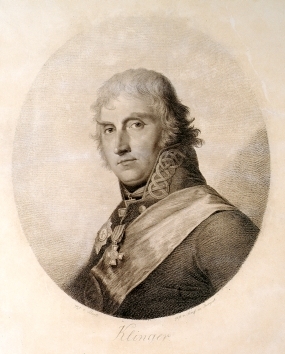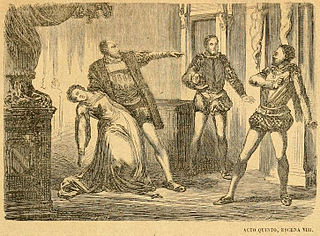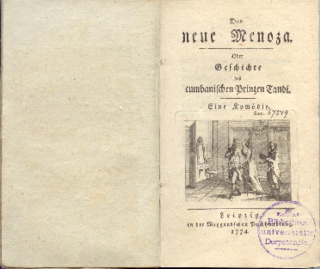
Friedrich Maximilian von Klinger was a German dramatist and novelist. His play Sturm und Drang (1776) gave its name to the Sturm und Drang artistic epoch. He was a childhood friend of Johann Wolfgang von Goethe and is often closely associated with Jakob Michael Reinhold Lenz. Klinger worked as a playwright for the Seylersche Schauspiel-Gesellschaft for two years, but eventually left the Kingdom of Prussia to become a General in the Imperial Russian Army.

Karl Georg Büchner was a German dramatist and writer of poetry and prose, considered part of the Young Germany movement. He was also a revolutionary and the brother of physician and philosopher Ludwig Büchner. His literary achievements, though few in number, are generally held in great esteem in Germany and it is widely believed that, had it not been for his early death, he might have joined such central German literary figures as Johann Wolfgang von Goethe and Friedrich Schiller at the summit of their profession.

Jakob Michael Reinhold Lenz was a Baltic German writer of the Sturm und Drang movement.

Bourgeois tragedy is a form of tragedy that developed in 18th-century Europe. It is a fruit of the enlightenment and the emergence of the bourgeois class and its ideals. It is characterized by the fact that its protagonists are ordinary citizens.

Heinrich Leopold Wagner was a German dramatist of the Sturm und Drang movement.
Gert Hofmann was a German writer and professor of German literature.
Sturm und Drang was a proto-Romantic movement in German literature and music that occurred between the late 1760s and early 1780s. Within the movement, individual subjectivity and, in particular, extremes of emotion were given free expression in reaction to the perceived constraints of rationalism imposed by the Enlightenment and associated aesthetic movements. The period is named after Friedrich Maximilian Klinger's play of the same name, which was first performed by Abel Seyler's famed theatrical company in 1777.
Lenz is a novella fragment written by Georg Büchner in Strasbourg in 1836. It is based on the documentary evidence of Jean Frédéric Oberlin's diary. Jakob Michael Reinhold Lenz, a friend of Goethe, is the subject of the story. In March 1776 he met Goethe in Weimar. Later he suffered from mental disorder and was sent to Oberlin's vicarage in the Steintal. The story is concerned with this last incident. Although left unfinished at the time of Büchner's death in 1837, it has been seen as a precursor to literary modernism. Its influence on later writers has been immense. The story has been adapted for the stage as Jakob Lenz, a 1978 chamber opera by Wolfgang Rihm.

The Beuron school was an art movement founded by a confederation of Benedictine monks in Germany in the late 19th century.

Jakob Lenz is a one-act chamber opera by Wolfgang Rihm, written 1977–78 to a libretto by Michael Fröhling after Georg Büchner's 1836 novella Lenz which in turn is based on an incident in the life of the German poet Jakob Michael Reinhold Lenz (1751–1792). Rihm dedicated the opera to his teacher, Eugen Werner Velte.
Literaturoper, a term coined by the German music critic Edgar Istel, describes a genre of opera that emerged during the late 19th century. When an existing play for the legitimate theatre is set to music without major changes and without the intervention of a librettist, a “Literaturoper” is the result. Although the term is German, it can be applied to any kind of opera, irrespective of style or language.

Ahja is a small borough in Põlva Parish, Põlva County in southeastern Estonia. Named after the Ahja River, it is located 191 kilometers (119 mi) southeast of Tallinn and about 16 kilometers (9.9 mi) north of Põlva.
In medieval Europe, within the Holy Roman Empire, a Hofmeister was an official who acted as an aide to royalty or to a senior nobleman or cleric. Later it became a term for a schoolmaster who looked after the welfare of students in addition to their education.

Erich Schmidt was a German historian of literature.

Karl Gotthelf Jakob Weinhold was a German folklorist and linguist who specialized in German studies.
Soldaten is a 1930 opera in 3 acts by Manfred Gurlitt after the play of Jakob Michael Reinhold Lenz. It was premiered 9 November 1930, Düsseldorf, but later overshadowed by Bernd Alois Zimmermann's setting of Die Soldaten (1965).
Soldattransl. Soldier (in Danish, German, French, Norwegian, Romanian, and Swedish), plural Soldats(in French)Soldaten(in German)Soldater(in Danish, Norwegian, and Swedish), may refer to:
A tutor is somebody who helps teach another.

The New Menoza or a History of the Cumban Prinz Tandi is a 1773 comedy by Jakob Michael Reinhold Lenz, first published in Leipzig in 1774. Johann Wolfgang von Goethe arranged for the play's publishing.










